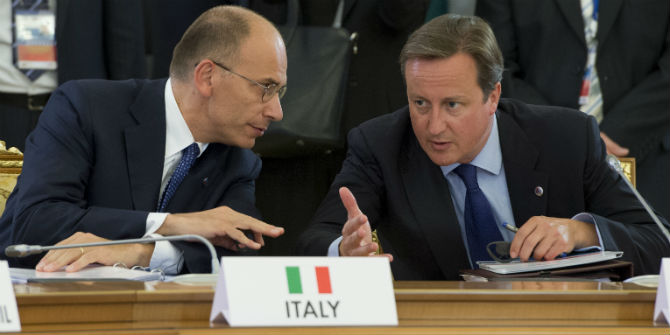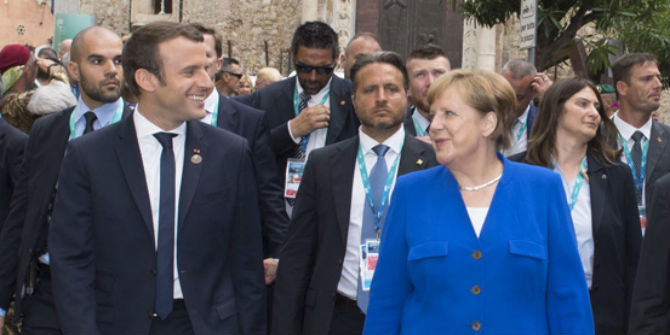 Enrico Letta was prime minister of Italy from 2013 to 2014, leading a grand coalition of parties from the left and right. He is now Dean of the Paris School of International Affairs (PSIA) at Sciences Po in Paris. Ros Taylor spoke to him just before he delivered a lecture at the LSE on 12 February 2016, shortly after the draft renegotiation deal was published.
Enrico Letta was prime minister of Italy from 2013 to 2014, leading a grand coalition of parties from the left and right. He is now Dean of the Paris School of International Affairs (PSIA) at Sciences Po in Paris. Ros Taylor spoke to him just before he delivered a lecture at the LSE on 12 February 2016, shortly after the draft renegotiation deal was published.
What did you think of David Cameron’s handling of the renegotiation?
First of all, I think that there’s a genuine interest on the European Council side in finding stable agreements that can help the British people to be comfortable remaining a member of the EU. The negotiation process was not easy for many reasons: the discussion overlapped with many topics that are very far from the core of the topic, like the refugee crisis. But the refugee crisis is top news in this period, and it is very easy for people to link subjects in an incorrect way. This is why this particular period makes it so difficult to have such a debate, and I understand why the European Council is so engaged in finding good solutions. Also, I know Cameron. I worked with him, he’s a very, very good negotiator. So I think he is taking a good result from the first steps of these negotiations. Of course, what will be the key point now is how to implement – and quickly – the general statements that are on the table now, and that is of course more difficult because there are many, many binding or legal constraints that are very complicated to apply.

So this is a deal that you would have been happy to sign up to when you were part of the European Council?
[He laughs] You know, if we take a look at the big picture, I think it tells us that we can’t have a Brexit as a positive outcome of this situation – neither for the UK nor for the EU. For many reasons. First of all, because the EU will lose one of its main pillars. You know, there’s always here in the United Kingdom an under-evaluation of the role of the UK inside the EU and in the EU’s successes. But I’m sure that, for instance, the single market – which is the most important success in 70 years of the EU – is mostly because of the UK’s role. The EU will lose a big pillar, but of course the UK too will have a lot of problems. When I say problems, I say first of all the superiority of London will be affected. London is today the financial capital of Europe and one of the four or five financial capitals of the world. But it was not the case 30 years ago when the single market was not in place. It is the case today, of course, because of the UK has performed very well in recent years, but also because of the single market. London is the open door to the richest market in the world, and for London to be here and to be in the single market is so important. But of course I also know this point is a domestic one – the point about the unity of the UK. It’s not a marginal problem. I think there will be a lot of negative consequences, a lot of problems for the UK, Scotland – even in Northern Ireland I heard worried voices. The consequences for Ireland will be terrible.
If you had the chance to reform the EU now through a renegotiation, what would be your priority?
I think this is one of the key points of the referendum. We will miss a big opportunity if we don’t take this referendum as the main opportunity to overcome the difficulties of Europe today, and push the competitiveness – the lost competitiveness – of Europe. The key point, in my view, is that we have to move clearly towards a two-circle Europe, and I am a little bit concerned because I don’t see the goodwill to take the referendum as an opportunity for a big change in the EU’s architecture. It would be, in my view, positive for both – positive for the UK: the UK would consider this really important for the EU as a whole, not only [as a fix for its] domestic problems. And it would be important for Europe too, because Europe needs to have some kind of some external push to [reform its] core. This is why I think we need to move toward a two-circle Europe. When I say two-circle Europe, I mean a large EU of 28 without the call of ever-closer union, but sharing policies like the single market, foreign trade, foreign and security policy with the rest of the union.
More than simply eurozone/non-eurozone groupings?
The idea of having a large circle of 28 is also going to be attractive to countries like Switzerland, Norway and Serbia that are today out of the EU. In my view, they could consider being members in the future because being a member in that situation doesn’t mean being obliged to [sign up to] further integration or to be on a federal roadmap. Then the core circle of the euro area countries would be able to take this opportunity to move towards a more integrated euro area. Because without economic union, just with monetary union alone, the euro area doesn’t work. The lack of economic union in many, many fields – I mean capital markets, I mean telecoms, I mean banking union – we didn’t finalise this, and the problems are out there and they are really very complicated. This is why I think this idea is a win-win solution: it’s a win for the UK, it’s a win for eurozone members, for continental Europe.
You now work in France, where Marine Le Pen is leading the Front National to a surge in popularity. Given the FN and similar nationalist parties in other countries all want to leave the EU, are you worried about her success?
The French [electoral] system doesn’t allow us to think that Marine Le Pen would be the next president, because of the ballot [the two-candidate presidential runoff]. I think she will be one of the two, and I think her score in the second ballot will be absolutely better than the one her father had 15 years ago. So I think she is competitive, and we must not underestimate the role of Marine Le Pen and the Front National, even if it would be difficult for her to be president, because her strength is not only linked to issues like migrants and so on. There is, in France, something more. It is linked, in my view, to the relationship between the elites and the people: there is an angry fight between people and the establishment elite. It is not just a French situation. Look at what is happening in the US in this period. But in France there’s a big, big fight against the so-called elites, so I think the electoral campaign will be fairly tough, very difficult.
Dean Enrico Letta delivered a lecture at the LSE on The Future of the EU in the Face of Brexit. A podcast of his lecture is available here.







I recommend highly Enrico Letta’s talk at LSE, here — to anyone interested in Brexit, the UK, Europe, the EU, and geopolitical things in-general… very much including Global Warming and Migration — he is an Italian, former prime minister, his lecture and its following Q&A eloquently express a European statesman’s passionate point of view.
The growing European chaos he describes already is on Britain’s doorstep, and I believe, nearly as passionately as Letta does, that it is one which Britain must help solve: shutting the door will not solve it — the Channel is a narrow & shallow sea — & it offers no protective barrier at all, any more, in a Global & Online-Digital Age.
Letta’s initial questioner asks him whether what is needed now is a total rewrite for the EU, a “Philadelphia”. Letta replies that he, and the French, fear a slipping-back, should their dilemma be approached as a re-write, the risk is a baby/bathwater fiasco…
The questioner forgets, perhaps, that “Philadelphia” considered that risk a great one too: those sessions were highly-secret — also they greatly exceeded their mandate.
And the questioner forgets as well that “Philadelphia” produced not a perfect solution, as-viewed now in retrospect after 2+ centuries of complicated history, but only an initial trial balloon filled with flaws, the worst of which were only partially resolved 70 years after in an enormous Civil War, a conflict still the most costly in human lives lost of any conflict the US ever has fought. And even today the US “constitution” changes radically, regularly: this week alone, among many other pending & very serious battles, Apple and the FBI are grappling over civil liberties — it’s the process, not the document, and that fully 200 years later.
Perfection has forever been the enemy of the good, furthermore, in politics — Europe will fall apart, long before it ever finds a perfect governmental solution — so some sort of more gentle muddling-through solution must be accomplished now. Letta is firmly in that incrementalist camp, and he is optimistic: the Brexit vote, which he believes will go contra if only because it makes no sense for Britain, can be a reaffirmation-of and path-forward-for the EU, he declares hopefully.
For Italians, “crisis is normal”, he gently reminds his London audience — so he has had much personal experience with incremental solutions. His own, for Europe now, is what he calls a “2-Circle Union: a large group of 28 nations, including Switzerland & Norway & Britain, and another smaller “core” group headed toward “ever-closer union” & even “small-‘f’ federalism”. Both groups “going the same speed”, he asserts… altho I’m not sure how that might be accomplished…
My own thought is more stark: that a Brexit will convert Britain into an enormous offshore “entrepôt” banking-center — for the EU Single Market, maybe, but also for the US, China, India, the Entire Globe going forward… one-stop-shopping global/digital finance, something banks regulated by Brussels or Beijing or Tokyo or Washington DC are unable to provide… Such appears to be the dream of some, for Britain now, or it may be just the inevitable “comparative-advantage” result of their Brexit dreams: there is in fact much demand for this service by Global Finance, now, but every Brit would become a banker, and do they all want to? The City doubled in size and quadrupled in national economic & cultural importance? Every Brit a banker?
At the same time, Europe needs Britain greatly — and without them it will founder — that is this thoughtful Italian statesman’s view, anyway. The “hole” in the entire global economy created by the rapid disappearance of its currently-largest trading group, the EU, would be an enormous and very “dark” one.
So, read and listen to what Letta has to say, and then consider carefully. The French just dodged their Front National bullet — we the US, probably still, will not be giving you Trump — now please don’t give us all Isolationist-Britain.